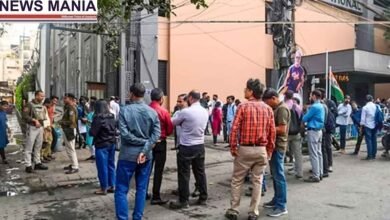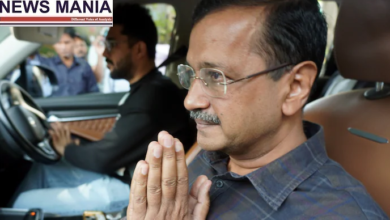Delhi Court Grants Bail to Arvind Kejriwal in Money Laundering Case

News Mania Desk/ Agnibeena Ghosh/22nd June 2024
A Delhi court granted bail to Chief Minister Arvind Kejriwal on Thursday in connection with a money laundering case linked to a now-cancelled excise policy. Special Judge Niyay Bindu set the bail amount at ₹1 lakh, with specific conditions attached, including that Kejriwal must not interfere with the investigation or attempt to influence witnesses.
The Enforcement Directorate (ED) requested a 48-hour window to accept the bail bonds to potentially challenge the decision in a higher court. However, Judge Bindu clarified that there would be no stay on the bail order. Kejriwal’s counsel can submit the bail bond to the relevant judge the following day.
Reacting to the news, Punjab Chief Minister and senior Aam Aadmi Party (AAP) leader Bhagwant Mann expressed his satisfaction on social media, stating, “We have faith in the court… Kejriwal ji gets bail… truth wins.”
AAP MP Sanjay Singh, who is also out on bail in the same case, criticized the ED’s arguments, calling them baseless and deceptive. He asserted that Kejriwal’s release would strengthen democracy, describing the case as a fabricated attempt to ensnare the AAP leader.
Rajya Sabha MP Kapil Sibal also congratulated Kejriwal on securing bail, remarking that it was “long overdue.” He added that now that the elections are over, there was no need to keep Kejriwal in jail, criticizing the justice delivery system as unfair.
Judge Bindu’s order came after two days of hearings. During the proceedings, the ED attempted to link Kejriwal to the alleged proceeds of crime and his co-accused, while the defense argued that the prosecution lacked substantial evidence.
The ED pointed to an incident on November 7, 2021, during the Goa assembly election campaign, when Kejriwal stayed at the Grand Hyatt hotel with the bill paid by Chanpreet Singh, who allegedly managed AAP funds in Goa. The ED claimed that Chanpreet Singh paid ₹1 lakh to the hotel in two installments and that he had received ₹45 crore from various ‘Angadiyas’ (couriers), which are part of an informal banking network prevalent in the jewelry trade.
However, Kejriwal’s counsel argued that the entire case against him was built on statements from individuals who had confessed to being guilty. These statements, the counsel claimed, were from people who were not only tainted but also might have been promised bail or pardon. The defense emphasized that these statements alone could not establish Kejriwal’s guilt and that there was no concrete evidence linking ₹100 crore from the South Group to him.
Kejriwal was arrested on March 21, just weeks before the parliamentary elections. The Supreme Court had granted him interim bail on May 10, allowing him to campaign for the Lok Sabha elections until June 1. During this period, the Aam Aadmi Party launched a vigorous ‘Jail ka Jawab Vote Se’ campaign. Kejriwal, while on interim bail, repeatedly claimed that he would not have to stay in jail if the opposition INDIA bloc came to power. Although the ruling Bharatiya Janata Party (BJP) managed to secure a third consecutive term, it fell short of achieving a parliamentary majority on its own.
The bail granted to Kejriwal marks a significant development in the ongoing legal and political battle. His release is seen as a victory for the AAP and a blow to the ED’s case, which has been criticized as politically motivated. The case continues to be a focal point in the broader narrative of political rivalry and judicial scrutiny in India.






